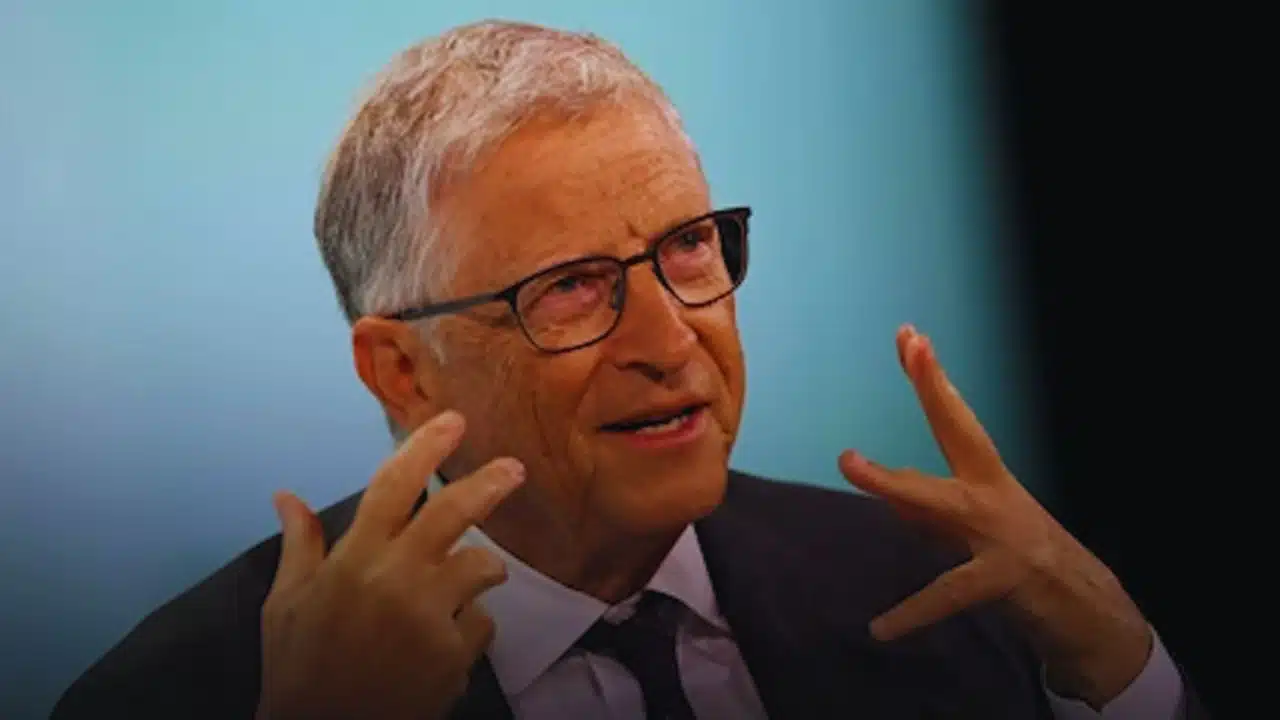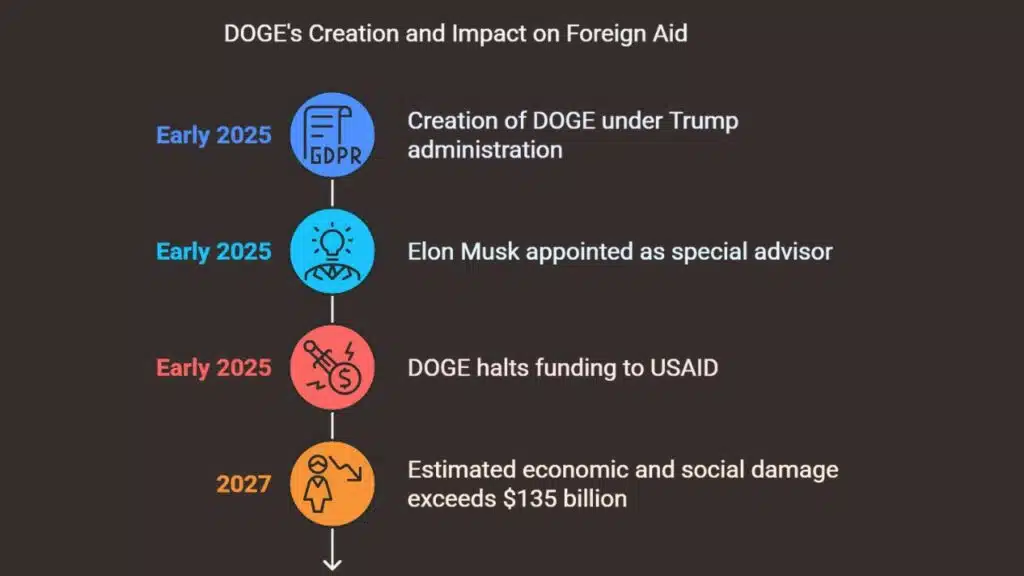In a major escalation of their long-standing feud, Microsoft co-founder and global philanthropist Bill Gates has openly condemned tech billionaire Elon Musk for his role in slashing U.S. development aid programs—arguing that Musk’s actions are directly endangering the lives of millions of vulnerable people across the globe.
Speaking in an exclusive interview with the Financial Times, Gates accused Musk of dismantling critical humanitarian infrastructure, including health programs supported by the U.S. Agency for International Development (USAID), which he says has led to severe consequences in regions already suffering from poverty, disease, and conflict.
Abrupt Termination of USAID Programs Sparks Global Crisis
According to Gates, the decision to abruptly shut down USAID operations—which historically supported vaccination drives, food distribution, and emergency medical services—has had devastating effects on some of the world’s most fragile communities. The closure was orchestrated through the Department of Government Efficiency (DOGE), a controversial agency reportedly backed by Musk and intended to “streamline” U.S. federal spending.
“Suddenly, food and medicine meant for people in Africa and Asia were just sitting in warehouses,” Gates explained. “We’re already seeing consequences—measles outbreaks, missed HIV treatments, and disruptions in polio eradication campaigns.”
USAID had been instrumental in providing lifesaving HIV-prevention treatments, maternal health services, childhood vaccinations, and nutritional assistance across low-income countries, including Mozambique, South Sudan, Pakistan, and Bangladesh. With funding halted, these programs are collapsing.
The Gaza Confusion: A Dangerous Misjudgment
In a striking example of the fallout, Gates pointed to a specific incident where Musk allegedly canceled funding for a hospital in Gaza Province, Mozambique, due to a misunderstanding. Reports suggest Musk believed the hospital was associated with the Middle Eastern region of Gaza, confusing it with conflict-ridden Gaza Strip controlled by Hamas.
The hospital in Mozambique was a high-impact HIV-prevention center serving thousands. “That error alone might lead to hundreds of unnecessary deaths,” Gates said. While Musk later acknowledged the mix-up, the funding was never restored, and services remain suspended.
Gates did not mince words: “The picture of the world’s richest man killing the world’s poorest children is not a pretty one.”
DOGE’s Creation and Its Impact on Foreign Aid
The Department of Government Efficiency, commonly referred to as DOGE, was created under the Trump administration in early 2025 as part of a radical restructuring of federal agencies. Elon Musk was appointed as a special advisor, bringing with him a cost-cutting philosophy often applied in his companies like Tesla and Twitter (now X).
One of DOGE’s first moves was to halt funding to USAID, citing what it called “mismanagement, inefficiency, and political bias.” The move was defended as a cost-saving measure, with officials claiming it would save the government $160 billion over five years.
However, independent policy watchdogs and humanitarian organizations have since published reports suggesting the cost of the chaos far outweighs the savings. Some estimate that the economic and social damage from canceled health programs and humanitarian crises could exceed $135 billion globally by 2027.
Critics argue that DOGE operated without transparency or accountability, and foreign aid experts claim the cuts were made without consulting medical advisors, diplomats, or affected local governments.
Gates Accelerates Personal Giving: Plans to Spend $200 Billion by 2045
In response to the dismantling of global aid infrastructure, Bill Gates has announced an urgent expansion of his philanthropic efforts. He pledged to spend nearly his entire personal fortune—estimated at over $200 billion—within the next 20 years.
By 2045, the Bill & Melinda Gates Foundation, founded in 2000, will shut down permanently after fulfilling its final round of grant commitments. Gates says this move is meant to demonstrate what ultra-wealthy individuals can do within their lifetimes, rather than relying on long-term legacies.
“People will say many things about me after I’m gone, but I refuse to let ‘he died rich’ be one of them,” Gates said in a blog post announcing the plan.
The foundation has already donated over $100 billion to global causes, including vaccine development, polio eradication, education initiatives, and climate adaptation for developing countries. Gates emphasized that while private philanthropy can help, governments still bear the largest responsibility when it comes to large-scale humanitarian programs.
Technology vs. Traditional Philanthropy: Gates vs. Musk
The growing tension between Gates and Musk is rooted in a larger ideological divide.
- Musk believes that market-driven innovation—such as electric vehicles, AI, and space exploration—can solve many of humanity’s most pressing problems. He often criticizes traditional philanthropy as inefficient, once calling it “bullshit” during a podcast appearance in 2023.
- Gates, by contrast, sees direct intervention and public health programs as essential. “We can’t code our way out of a measles outbreak. You don’t need a robot; you need vaccines,” Gates said.
The two billionaires have clashed before—over climate change, COVID-19 vaccines, AI regulation, and charitable giving strategies. This most recent confrontation marks a new peak in their public disagreement, now involving real-world consequences for millions of people.
Global Response and Expert Warnings
The international development community has echoed Gates’ concerns. A coalition of NGOs—including the World Health Organization (WHO), GAVI, and Doctors Without Borders—warns that 2025 could be a disastrous year for global health if aid gaps are not filled.
- The WHO reports a 30% drop in vaccine delivery to sub-Saharan Africa since DOGE’s actions.
- GAVI noted that measles immunization rates fell below 80% in five countries previously supported by USAID.
- UNICEF has requested emergency funding to prevent a cholera outbreak in South Sudan where medical aid has been interrupted.
Call to Action: Gates Urges Billionaires to Rethink Their Priorities
In his final remarks, Gates made a passionate appeal to other billionaires and global leaders.
“I’m not saying innovation isn’t important—it is. But starving children don’t need self-driving cars. They need food, clean water, and vaccines. That’s what saves lives.”
He emphasized that humanitarian crises are urgent, and the solutions must include both public funding and direct aid—not just long-term tech investments.
“We’re in a moment where we can choose between action and indifference. I hope we choose wisely.”
Bill Gates’ strong condemnation of Elon Musk’s role in cutting U.S. foreign aid has brought new urgency to the conversation around global philanthropy and responsibility. As Gates pledges to give away his fortune to combat poverty, disease, and inequality, the world is watching how other billionaires—and governments—will respond to a growing humanitarian crisis.
The information is Collected from MSN and NBC News.





































